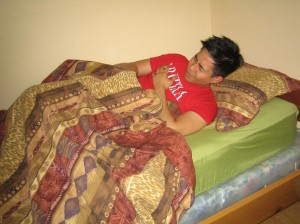Insomnia is also called as sleeplessness. It’s a sleep illness where people have the difficulty in sleeping. It is typically accompanied by daytime sleepiness, low energy, irritation and being moody and may result to problems on focusing and learning. Insomnia can be short term disorder, lasting for days or weeks. It can also be a long term disorder that lasts more than a month.
Sleep hygiene and lifestyle variations are usually the first medication for insomnia. Sleeping pills may help but medications are not recommended for more than four to five weeks.
Types of Insomnia
There are several types of insomnia. These are the following:
- Transient Insomnia – This type of insomnia lasts less than a week. It can be caused by another disorder, by means of changes in the sleep environment, severe depression, or by stress.
- Acute Insomnia – It is the inability to constantly sleep well for a period of less than a month. It is also called as stress related insomnia.
- Chronic Insomnia – This type of insomnia lasts longer more than a month. It causes double vision.

What Causes Insomnia?
Physical factors and psychological factors can cause insomnia. There is a lot of underlying ailment that sources chronic insomnia, while transient insomnia may be triggered to a current event or occurrence. This is usually caused by the following:
- Psychological issue – People with anxiety, depression or psychotic disorders are more prone to insomnia.
- Medical conditions – Brain tumors, stroke and fatigue can cause insomnia.
- Hormones – Among women estrogen hormone shifts during menstruation.
- Other Factors like sleeping next to a snoring partner, genetic conditions, pregnancy and parasites are some that can cause insomnia.
Signs and Symptoms of Insomnia
Insomnia can be a symptom of an underlying medical disorder. However, several signs and symptoms are associated with insomnia:
- Struggle falling asleep at night
- Waking during the night
- Still feeling tired after a night’s sleep
- Daytime fatigue or sleepiness
- Irritability, depression or anxiety
- Poor concentration and focus
- Being uncoordinated, an increase in errors or accidents
- Tension headaches
- Difficulty socializing
- Gastrointestinal symptoms
Treatments for Insomnia
Several types of insomnia determine when the underlying origin is handled or wears off. Insomnia management attentions on determining the cause. The cause of insomnia can be properly treated once identified. Non-pharmacological methods and home remedies for insomnia include:
- Improve sleep hygiene
- Use relaxation techniques
- Cognitive Therapy
- Stimulus control therapy
- Sleep restriction
Medical treatments for insomnia include:
- Prescription sleeping pills
- Antidepressants
- Antiistamines
- Melatonin
